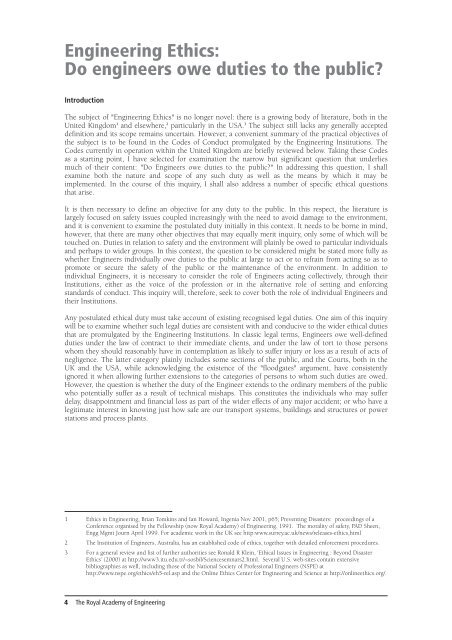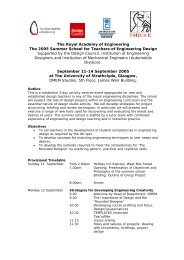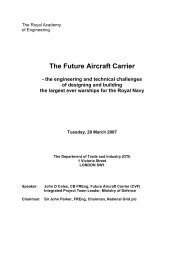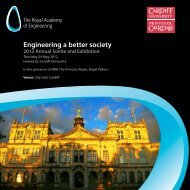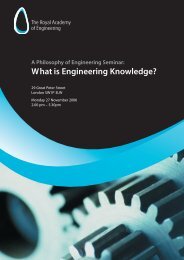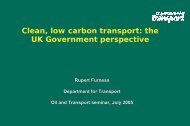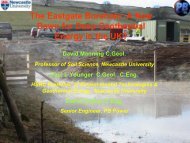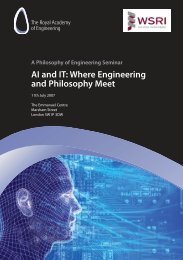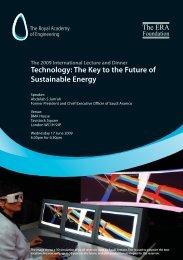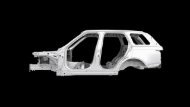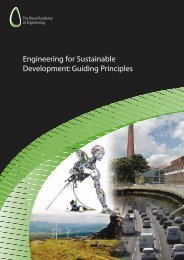Engineering Ethics: Do engineers owe duties to the
Engineering Ethics: Do engineers owe duties to the
Engineering Ethics: Do engineers owe duties to the
You also want an ePaper? Increase the reach of your titles
YUMPU automatically turns print PDFs into web optimized ePapers that Google loves.
<strong>Engineering</strong> <strong>Ethics</strong>:<br />
<strong>Do</strong> <strong>engineers</strong> <strong>owe</strong> <strong>duties</strong> <strong>to</strong> <strong>the</strong> public?<br />
Introduction<br />
The subject of "<strong>Engineering</strong> <strong>Ethics</strong>" is no longer novel: <strong>the</strong>re is a growing body of literature, both in <strong>the</strong><br />
United Kingdom 1 and elsewhere, 2 particularly in <strong>the</strong> USA. 3 The subject still lacks any generally accepted<br />
definition and its scope remains uncertain. H<strong>owe</strong>ver, a convenient summary of <strong>the</strong> practical objectives of<br />
<strong>the</strong> subject is <strong>to</strong> be found in <strong>the</strong> Codes of Conduct promulgated by <strong>the</strong> <strong>Engineering</strong> Institutions. The<br />
Codes currently in operation within <strong>the</strong> United Kingdom are briefly reviewed below. Taking <strong>the</strong>se Codes<br />
as a starting point, I have selected for examination <strong>the</strong> narrow but significant question that underlies<br />
much of <strong>the</strong>ir content: "<strong>Do</strong> Engineers <strong>owe</strong> <strong>duties</strong> <strong>to</strong> <strong>the</strong> public?" In addressing this question, I shall<br />
examine both <strong>the</strong> nature and scope of any such duty as well as <strong>the</strong> means by which it may be<br />
implemented. In <strong>the</strong> course of this inquiry, I shall also address a number of specific ethical questions<br />
that arise.<br />
It is <strong>the</strong>n necessary <strong>to</strong> define an objective for any duty <strong>to</strong> <strong>the</strong> public. In this respect, <strong>the</strong> literature is<br />
largely focused on safety issues coupled increasingly with <strong>the</strong> need <strong>to</strong> avoid damage <strong>to</strong> <strong>the</strong> environment,<br />
and it is convenient <strong>to</strong> examine <strong>the</strong> postulated duty initially in this context. It needs <strong>to</strong> be borne in mind,<br />
h<strong>owe</strong>ver, that <strong>the</strong>re are many o<strong>the</strong>r objectives that may equally merit inquiry, only some of which will be<br />
<strong>to</strong>uched on. Duties in relation <strong>to</strong> safety and <strong>the</strong> environment will plainly be <strong>owe</strong>d <strong>to</strong> particular individuals<br />
and perhaps <strong>to</strong> wider groups. In this context, <strong>the</strong> question <strong>to</strong> be considered might be stated more fully as<br />
whe<strong>the</strong>r Engineers individually <strong>owe</strong> <strong>duties</strong> <strong>to</strong> <strong>the</strong> public at large <strong>to</strong> act or <strong>to</strong> refrain from acting so as <strong>to</strong><br />
promote or secure <strong>the</strong> safety of <strong>the</strong> public or <strong>the</strong> maintenance of <strong>the</strong> environment. In addition <strong>to</strong><br />
individual Engineers, it is necessary <strong>to</strong> consider <strong>the</strong> role of Engineers acting collectively, through <strong>the</strong>ir<br />
Institutions, ei<strong>the</strong>r as <strong>the</strong> voice of <strong>the</strong> profession or in <strong>the</strong> alternative role of setting and enforcing<br />
standards of conduct. This inquiry will, <strong>the</strong>refore, seek <strong>to</strong> cover both <strong>the</strong> role of individual Engineers and<br />
<strong>the</strong>ir Institutions.<br />
Any postulated ethical duty must take account of existing recognised legal <strong>duties</strong>. One aim of this inquiry<br />
will be <strong>to</strong> examine whe<strong>the</strong>r such legal <strong>duties</strong> are consistent with and conducive <strong>to</strong> <strong>the</strong> wider ethical <strong>duties</strong><br />
that are promulgated by <strong>the</strong> <strong>Engineering</strong> Institutions. In classic legal terms, Engineers <strong>owe</strong> well-defined<br />
<strong>duties</strong> under <strong>the</strong> law of contract <strong>to</strong> <strong>the</strong>ir immediate clients, and under <strong>the</strong> law of <strong>to</strong>rt <strong>to</strong> those persons<br />
whom <strong>the</strong>y should reasonably have in contemplation as likely <strong>to</strong> suffer injury or loss as a result of acts of<br />
negligence. The latter category plainly includes some sections of <strong>the</strong> public, and <strong>the</strong> Courts, both in <strong>the</strong><br />
UK and <strong>the</strong> USA, while acknowledging <strong>the</strong> existence of <strong>the</strong> "floodgates" argument, have consistently<br />
ignored it when allowing fur<strong>the</strong>r extensions <strong>to</strong> <strong>the</strong> categories of persons <strong>to</strong> whom such <strong>duties</strong> are <strong>owe</strong>d.<br />
H<strong>owe</strong>ver, <strong>the</strong> question is whe<strong>the</strong>r <strong>the</strong> duty of <strong>the</strong> Engineer extends <strong>to</strong> <strong>the</strong> ordinary members of <strong>the</strong> public<br />
who potentially suffer as a result of technical mishaps. This constitutes <strong>the</strong> individuals who may suffer<br />
delay, disappointment and financial loss as part of <strong>the</strong> wider effects of any major accident; or who have a<br />
legitimate interest in knowing just how safe are our transport systems, buildings and structures or p<strong>owe</strong>r<br />
stations and process plants.<br />
1 <strong>Ethics</strong> in <strong>Engineering</strong>, Brian Tomkins and Ian Howard, Ingenia Nov 2001, p65; Preventing Disasters: proceedings of a<br />
Conference organised by <strong>the</strong> Fellowship (now Royal Academy) of <strong>Engineering</strong>, 1991. The morality of safety, PAD Sheen,<br />
Engg Mgmt Journ April 1999. For academic work in <strong>the</strong> UK see http:www.surrey.ac.uk/news/releases-ethics,html<br />
2 The Institution of Engineers, Australia, has an established code of ethics, <strong>to</strong>ge<strong>the</strong>r with detailed enforcement procedures.<br />
3 For a general review and list of fur<strong>the</strong>r authorities see Ronald R Klein, ‘Ethical Issues in <strong>Engineering</strong> : Beyond Disaster<br />
<strong>Ethics</strong>’ (2000) at http://www3.itu.edu.tr/~sosbil/Sciencesemnars2.html. Several U.S. web-sites contain extensive<br />
bibliographies as well, including those of <strong>the</strong> National Society of Professional Engineers (NSPE) at<br />
http://www.nspe.org/ethics/eh5-rel.asp and <strong>the</strong> Online <strong>Ethics</strong> Center for <strong>Engineering</strong> and Science at http://onlineethics.org/.<br />
4 The Royal Academy of <strong>Engineering</strong>


